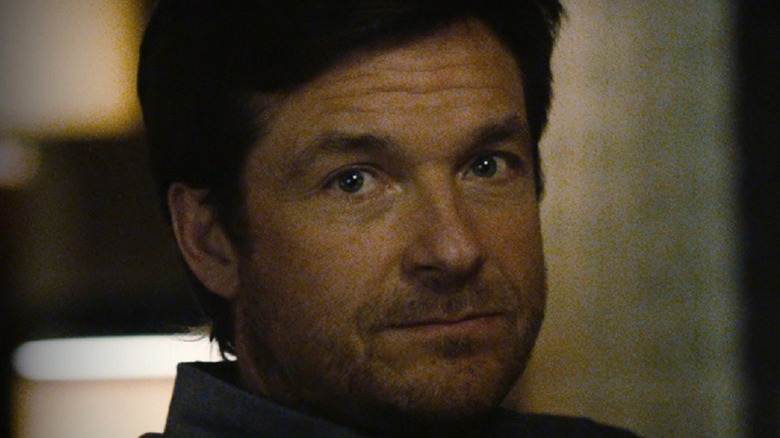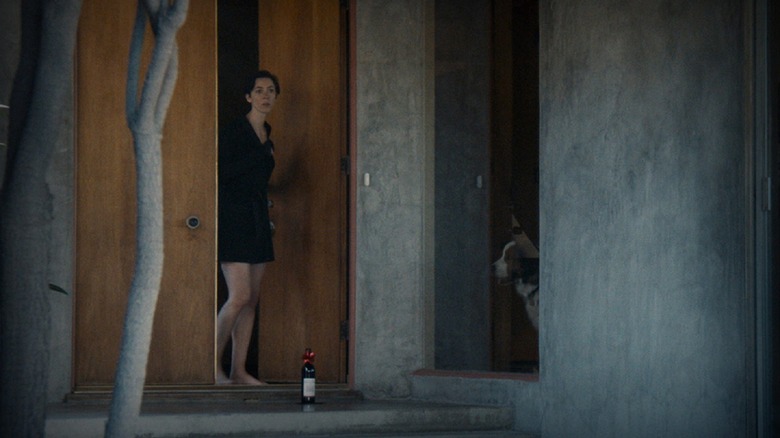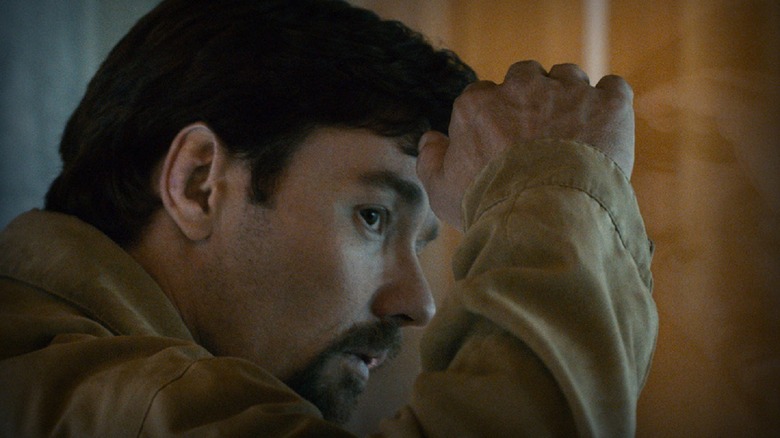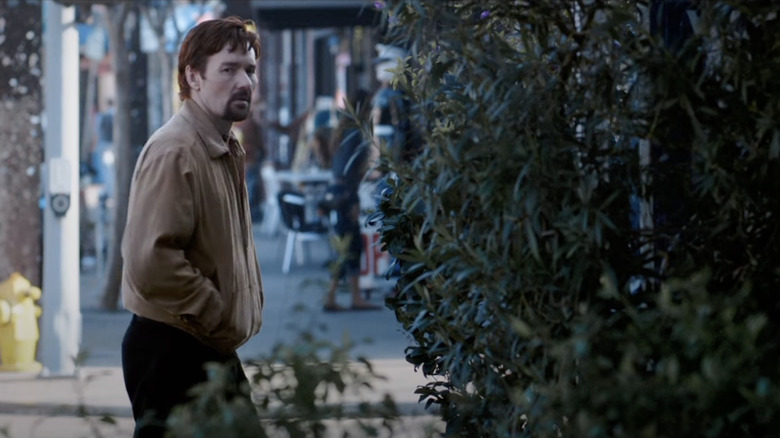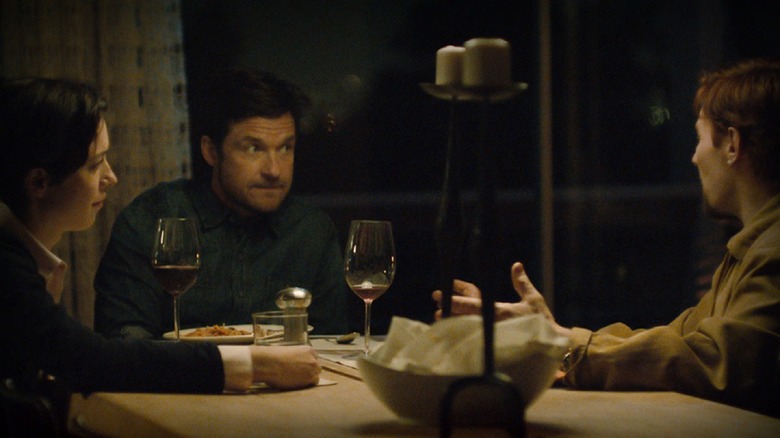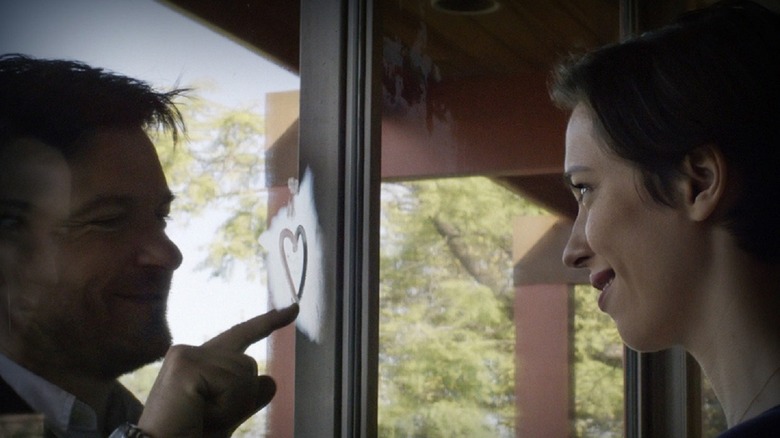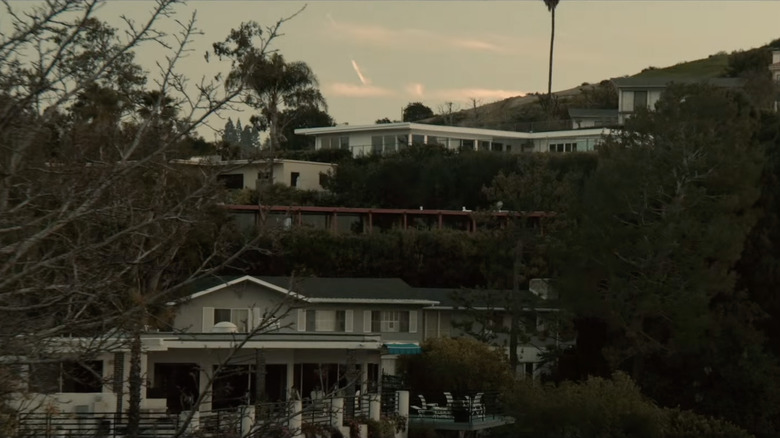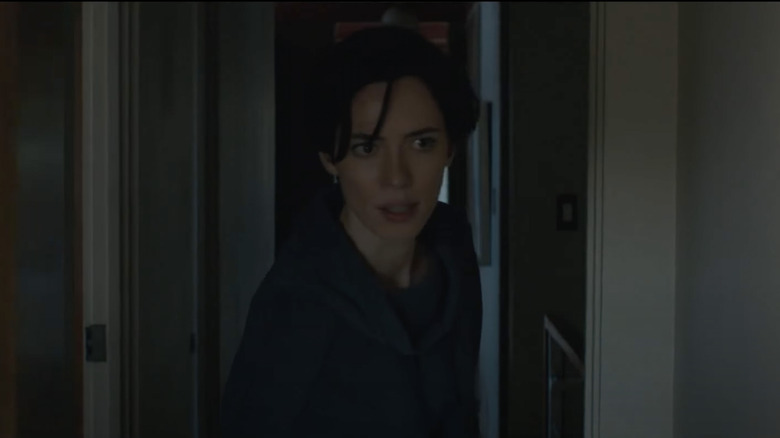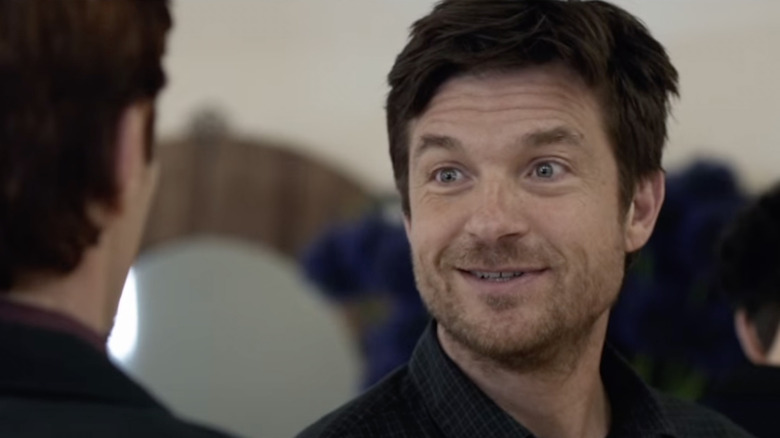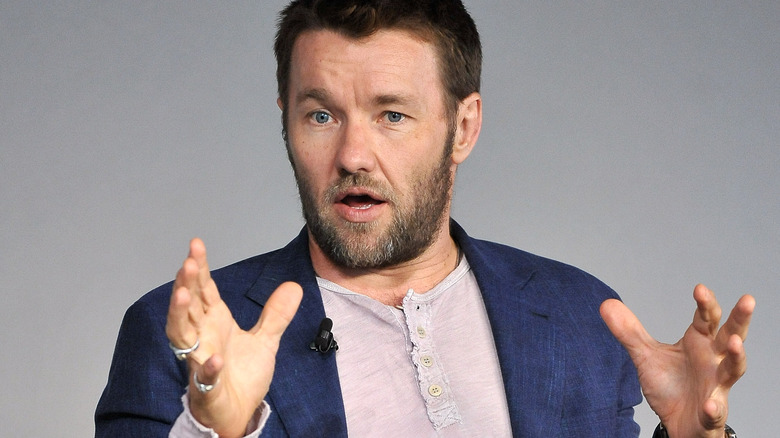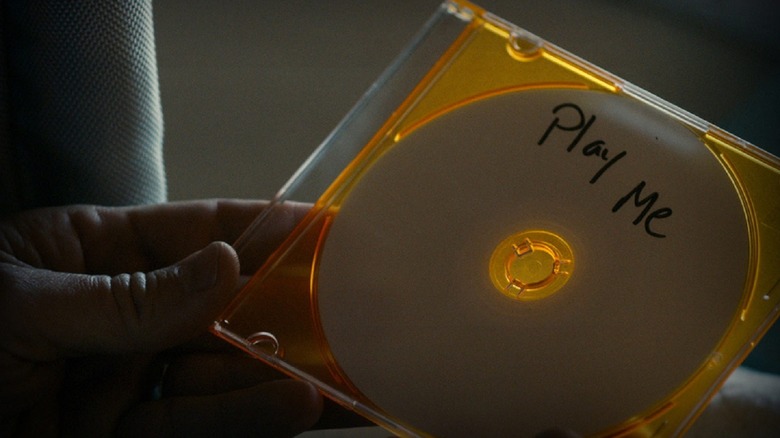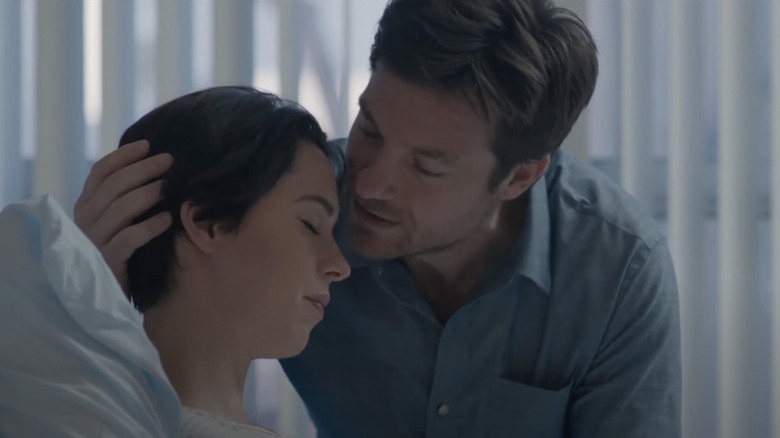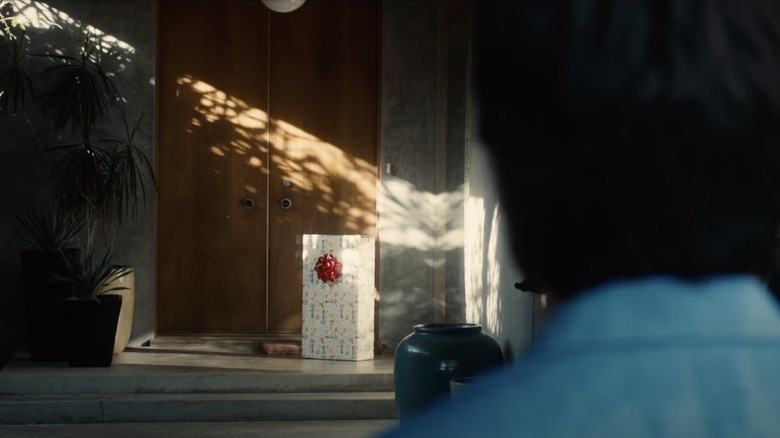The Untold Truth Of The Gift
The setup for the 2015 film "The Gift" is simple: Robyn (Rebecca Hall) and Simon (Jason Bateman), a picture-perfect couple, have just moved into their dream house in Los Angeles. One day while they're shopping, Simon is stopped by Gordon, a classmate from high school that Simon hasn't seen in 20 years. Gordon wants to catch up and become friends with the couple, and that's when everything gets much more complicated. Would it be nice to get a series of expensive, personal gifts from a long-lost acquaintance? Or would it be creepy?
This suspenseful thriller is the work of Joel Edgerton, who you might recognize as Owen Lars in the Star Wars prequels and the "Obi-Wan Kenobi" series. He not only wrote, directed, and produced the film, but he also stars in it as the mysterious Gordon. Here are some other interesting facts about the creation of the disturbing film "The Gift."
It was inspired by classic domestic thrillers
As Joel Edgerton told RogerEbert.com, he wanted to "invite people into a familiar genre." That genre? The domestic thriller. Edgerton cites "Fatal Attraction" and "Cape Fear" among his inspirations for the story of "The Gift." Both of those films have a similar setup: a stranger comes into a seemingly perfect couple's life and upends life as they know it. This gave Edgerton a chance to delve into the relationship dynamics between his characters, while also keeping the film entertaining and tense. "I was making a smart drama about the implosion of a relationship," he told The New York Times.
Edgerton knowingly strayed from genre conventions on occasion, the most notable of which was the film's treatment of Simon and Robyn's dog. Domestic thriller movies are notorious for treating family pets terribly — the rabbit in "Fatal Attraction," for example, comes to a particularly nasty end — but when Mr. Bojangles, the couple's dog in "The Gift," goes missing, the story goes into a different direction. "I thought it might be nice to throw the genre on its head by having the dog return home perfectly healthy, albeit at the stroke of midnight," Edgerton told the Times. The dog's unexpected bark provides one of the film's best scares.
Joel Edgerton originally wrote the script just to act in, not direct
When working on the screenplay for "The Gift," Joel Edgerton was imagining it as a film for him to act in. He told CinemaBlend that his desire to play a new kind of character was the initial reason for writing the script: "It was the intention to strive to find a character I could play who would be overbearing and misunderstood and a bit creepy."
Though he had written short films and stories before, Edgerton had begun writing in earnest in 2011, when he was on set for "The Thing" (via Entertainment Weekly). During the long waits in his trailer between scenes, he wanted to keep occupied. Before "The Gift," Edgerton had written the 2013 film "Felony," and had also co-written "Jane Got a Gun." He acted in both of those films as well. Finding new roles, Edgerton told USA Today, "is a lot of what my writing is about: What do I want to play, what would I like to do, what sort of challenge would I like to have that other people really aren't offering to me?"
However, while he was finishing the script, he began to see the project as one he could direct. As he told EW, "The directing part of it came once I was not even halfway [through] writing it, I was like 'God, this is something I'd really like to make.'"
Joel Edgerton was concerned about casting himself
When Joel Edgerton decided he wanted to direct the film, he knew he'd have a lot on his plate. "I thought I should just direct it, and I'll throw playing the character away," he told ScreenSlam. But his instinct to play the character had taken hold; "the initial idea of playing that character was a little bit dominant," he said.
Casting himself as Gordon was not a decision Edgerton made lightly. "The question of whether I should be on screen and behind the camera was a big dilemma for me," he told Entertainment Weekly. "I wondered whether the idea of directing and acting in my first film was an ego issue." Edgerton was finally able to feel good about acting in the film when he realized how few scenes his character was actually in. "If I was number one on the call sheet and directing the movie I think that would have been hard to do," he said.
All of Joel Edgerton's scenes were filmed in seven days
Joel Edgerton knew that, with him acting in the film as well as directing it, he'd have to be strategic. He didn't want to spend much time wearing the hats of both actor and director. So he worked out the shooting schedule so that he'd only be acting for seven days of the shoot to give himself plenty of time to focus on directing. "I structured the shoot so there were two weeks of me just being a director," he told The New York Times. "And then afterward I could step in front of the camera once I hit the right rhythm." Even with all of this preparation, he was nervous: "That first day when I was in the makeup chair, I thought: What have I done?" he told the Times.
Luckily, Edgerton had great support on set in the shape of his brother, director Nash Edgerton. With his brother around, Edgerton had someone whose directorial eye he trusted. Additionally, this made everything logistically easier, as Edgerton said in an interview with Entertainment Weekly: "When you're moving so quickly on a small budget, there's not a lot of time to break the momentum by coming back behind the monitor and checking your own work." So it was very helpful to Edgerton to have someone on set that he trusted. He told Buro his brother is "a supremely talented director and someone I know better than anybody else."
The film originally had a different title
According to Entertainment Weekly, "The Gift" was not Joel Edgerton's first choice of title. The original script was called "Weirdo," as a nod to the mean-spirited nickname Simon called Gordon back in high school: Gordo the Weirdo. Simon immediately recalls the nickname when he and his wife unexpectedly bump into Gordon. Producer Jason Blum explained that the title change was his decision, telling EW, "I definitely will go on record saying I did not like the title 'Weirdo.' So I'll take the fall if you're not crazy about the title." According to Deadline, the title was changed in early 2015, about four months before the film's release.
There was a drawback to this change of title. Namely, there was already a film called "The Gift": Sam Raimi's psychological horror from 2000. However, the new name stuck. Now, it's hard to imagine the film without its signature turquoise-wrapped, red-ribboned gift box front and center.
The house is a real location in Los Angeles, not a set
The majority of "The Gift" takes place in the home of its central couple, Simon and Robyn, who relocate to Los Angeles from Chicago. "When we started scouting houses, we were looking for a house that was the sort of place that you would want to live in, that was an aspirational sort of place," Joel Edgerton told Rotten Tomatoes. Robyn is a designer, so it makes sense that the couples' house would have an artistic sensibility.
According to Los Angeles Magazine, the house in question is a 1962 house designed by David G. Clark in the Sherman Oaks neighborhood in Los Angeles. The house has plenty of luxurious features, such as the koi pond– which Gordon stocks with fish in the film as well as a pool and an espresso machine in the kitchen. The majority of the film was shot locally around the house, including an Urban Home store in Sherman Oaks and Elysian Park in Central Los Angeles.
The house was chosen for its central hallway
While the house is a mid-century marvel, it gradually becomes more menacing throughout the film. Edgerton told The New York Times that they chose the house specifically for its long, central corridor. This hallway is the setting of many of the most suspenseful scenes, where the camera can move slowly down the hallway.
Additionally, the huge windows gradually become more menacing in the film. Each pane of glass represents a place where someone could be watching Simon and Robyn from outside. "It took on a different feeling throughout the movie when [Robyn and Simon] start to feel like their life is being encroached upon," Edgerton told Rotten Tomatoes.
For Rebecca Hall, that sense of being watched was all too familiar. "My apartment in London... There's a window in the living room that's precisely on the level with the top of a double-decker bus. So whenever it stops, the whole top can just look." As a result, Hall created "an elaborate shutter arrangement" to create more privacy.
There were two different versions of Jason Bateman's character
A huge part of the tension in "The Gift" exists in the question of whether or not Simon was a bully to Gordon back in high school. "Initially Simon was a big football jock, a brute, more of a Tom Buchanan in the early stages of scripting," Joel Edgerton said in an interview with The Young Folks. As he developed the script, Edgerton became less interested in a typical jock caricature and more intrigued by someone who could do harm with words, an idea that solidified when he thought about casting Jason Bateman. "Jason was someone who I believed got by on his wits more, which can often be a more viper-tongued, vicious human being," Edgerton told RogerEbert.com. "That version of the character was really interesting to me."
For his part, Bateman found it exciting to work with the writer-director on a story that had layers of lies and deception. As he told CinemaBlend, "When you're trying to come up with that combination for the audience as far as what the right level of mislead should be... by having the director there to talk about and be able to accurately interpret what the writer's going for there made for that process to be really efficient."
The director didn't believe in the message of the movie
The impetus for "The Gift" is a case of bullying that happened between Simon and Gordon 20 years before the story. And it soon becomes clear that it wasn't just Simon calling Gordon "Gordo the Weirdo." Bullying was certainly on Joel Edgerton's mind as he wrote the screenplay. Some of his inspiration came from his own experience. "I'm sure I was mean to other kids and I was also, I wouldn't say bullied, but I had moments of feeling physically scared and terrorized by other kids," he told Buro. And it wasn't just physical pain on Edgerton's mind. "The idea that things said about us shouldn't hurt us? That doesn't really make sense to me," he told The Chicago Tribune. "Unfortunately the things we say about each other hold weight and they have a residue."
However, Edgerton has also been clear that "The Gift" isn't really about an anti-bullying message. He feels the story gets too dark. "It sends a message that I don't necessarily think beyond the idea of entertainment or a movie is really a great one because I believe in forgiveness," he told Sidewalks TV. Unfortunately for Robyn and Simon, Gordon doesn't agree with Edgerton on this one.
The film had an alternate ending that explained much more
"The Gift" ends very ambiguously, leaving the audience wondering whether or not Gordon committed a heinous crime. This ending has been somewhat controversial. Some critics admired the ending; CinemaBlend's Sean O'Connell wrote that "Edgerton's best gift to fans was the open-ended mystery he provided in the closing minutes." Others felt that the crime in question — whether or not Gordon attacked Robyn — was too serious to dance around. Katie Walsh wrote in The Playlist that Robyn "is reduced to a psychological revenge battleground between two men," and Sam Adams wrote in IndieWire that the ending is a "grievous misstep."
However, if you're seeking a more clear-cut answer about this notorious ending, you're in luck. Joel Edgerton told CinemaBlend that he filmed several endings. One of these endings included a flashback that puts the ending's question to rest. In this alternate ending, Gordon is shown filming himself with the incapacitated Robyn but then stopping, thereby not assaulting her.
Edgerton ultimately decided against this ending, feeling that it didn't have the same impact. He told Buro he didn't want the ending to be overly prescriptive, saying that he wanted the film to "be like a good kid's party where you get a little package at the end of it and you go home and chew on." While this ending certainly ignited conversation, some viewers may gain some comfort in knowing that Robyn was not assaulted.
There's a discreet reference to The Shining
Joel Edgerton took a lot of inspiration from other thrillers when writing "The Gift." In an interview for RogerEbert.com, he mentions "Rosemary's Baby," "Cache," "Pacific Heights," "Fatal Attraction," "Cape Fear," "Single White Female," and "The Shining."
Fans of "The Shining” might even notice a discreet reference to the classic Stanley Kubrick film. About an hour and a half into the movie, there's a shot of the outside of a hospital room. The room's number is 237. This, of course, is also the number of a particularly frightening forbidden room in the Overlook Hotel.
While Edgerton made an effort to upend the audience's expectations about the thriller genre, it's not surprising that he made a tribute to "The Shining" in his film. As he told The New York Times, "I wanted to create a piece of entertainment that tipped the hat to all the great genre movies that I'd seen."
The marketing campaign involved creepy gifts for journalists
Part of the reason critics took notice of "The Gift" upon its release was because of its stunt marketing campaign. Media personalities and critics were targeted by "Gordo" on social media, and some were even sent gifts that indicated that someone had been digging into their past. Before the film's release, the film's "claim to fame had previously been an advance publicity campaign that edged close to crossing the line between generating buzz and outright stalking," wrote Sam Adams in Indiewire.
Critics were delivered presents in the film's iconic red wrapping, but inside was anything but ordinary swag. Instead, the gifts were filled with highly personal items. One writer for The Verge received Polaroid-style prints of personal photos they had posted on Instagram, and a writer for Fast Company received a version of a vanity license plate he had joked on Twitter about getting. The gifts were signed by "@YourFriendGordo," a Twitter handle for Gordon's character set up specifically for the campaign.
